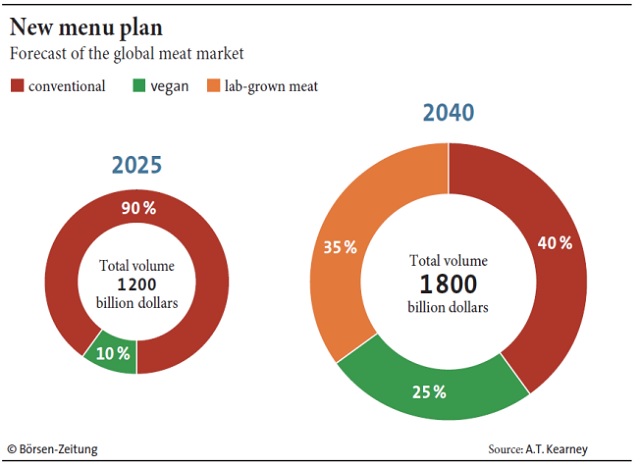Veggie Day is no longer a lifestyle choice; moderate meat consumption and meat substitutes are being considered key elements for climate protection. Many companies have entered the meat substitute business, but they are encountering legal hurdles, explains the legal expert Wolfgang Schönig in an interview. Their financing is nevertheless ensured and they arouse a huge appetite among venture capitalists.

Dr. Schönig, CO2-neutral meat production is considered one of the key aspects in the fight against climate change. Can we really make a big difference through our food choices?
According to expert estimates, conventional meat production takes up around 75% of the agricultural land used worldwide and is responsible for over 15% of the greenhouse gases emitted globally. This is a rising trend. Alternatives, such as plant-based meat substitutes or meat produced in cell cultures, are significantly more resource-conserving and climate-friendly by comparison, mainly because no greenhouse gases are produced, and the high water and energy consumption of conventional animal husbandry is eliminated. For the agri food industry, this is not so much an option, it's a necessity, as the industry will have to meet strict CO2 reduction requirements by 2030 as part of the EU's so-called Green Deal.
How often does environmentally friendly meat end up on your plate?
The market for meat substitutes is growing rapidly, and this is happening without strict regulatory requirements for the industry in terms of the CO2 reductions already in place. The market here probably anticipates the compelling need and sees the opportunities – both for plant based alternatives and for cell-cultured meat. It is important to remember that the world's population will grow to nearly 10 billion by 2050, all of whom will need sufficient protein foods. So it's not so much a lifestyle choice, but an essential contribution to curb CO2 emissions and preserve our lives. It also presents immense economic opportunities.
"American companies such as Beyond Meat and Upside Foods are currently among the leading manufacturers and developers of meat substitutes."
Which providers are ahead in the race?
American companies such as Beyond Meat and Upside Foods are currently among the leading manufacturers and developers. The Israeli manufacturer Redefine Meat is currently intensively pursuing its market entry in Europe. But EU-based start-ups like Mosa Meat are also working on alternative products for consumers in Europe. There are countless other examples. In any case, there will be no lack of money, as venture capitalists are in the process of setting up huge funds for this sector, including in Germany. The current focus, however, is more on plant-based meat substitutes. Products made from cultured meat are not yet as widespread, mainly because of regulatory uncertainties, but Singapore is an exception.
What is the legal framework for lab-grown meat? Is it possible to market meat from cell cultures in Europe?
The possibility of marketing cell-cultured meat definitely exists. However, as far as can be seen, no application for an authorization procedure has yet been received in the EU. The European legal framework is divided into two parts. If a new product or a new single protein is GMO-free, the Novel Food Regulation applies. If a product contains genetically modified organisms, it is subject also to the GMO Regulation. In this case, the Novel Food Regulation largely takes a back seat. This applies to both cell-cultured meat and plant-based meat alternatives.
To read the full article click here
Because of the generality of this update, the information provided herein may not be applicable in all situations and should not be acted upon without specific legal advice based on particular situations.
© Morrison & Foerster LLP. All rights reserved
